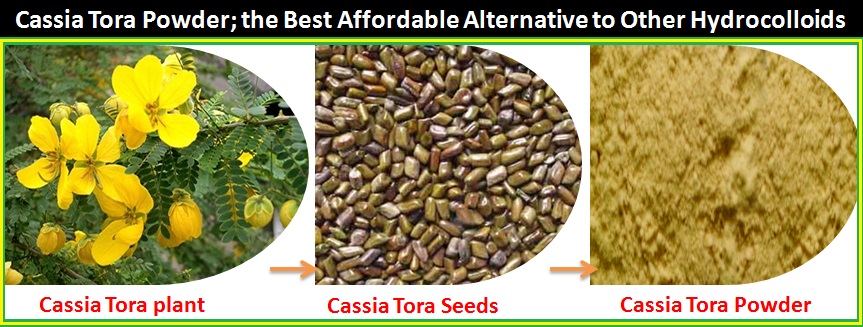Cassia Tora, also known as Caesalpiniaceae, is a wild crop that grows in India. It is often considered to be weed. There are many industrial applications of Cassia Gum Powder. Cassia gum has been around since a long time with more of applications being discovered by research work. It has several valuable properties; it is a thickening and gelling agent, hence it is useful in the pet food industry, cattle & poultry feed, dairy products, food industry, etc.
It is important to select the right manufacturer and exporter for Cassia Gum Powder to ensure the consistency of quality. This is highly important due its numerous food applications. For example, Europe has approved to use it as a stabilizer in manufacturing of canned pet foods. Japan has also given approval to use it as food additive. Several other Asian countries also use this in food products. Due to the industrial applications on a large scale, buyers often face the challenge of finding Cassia Gum Power of consistent quality. There are several certifications that help such buyers search for quality products.
Importance of quality consistency
For any industry, it is necessary to develop good quality products for their customers; for this they need to ensure all the material is of good quality including Cassia Powder which is an additive in several food products. Such industries have varied requirement for Cassia Gum Powder and need to ensure quality no matter what the quantity is. At times they also might have an urgent requirement; hence it is also necessary it reaches them on time.
If the quality is inconsistent the market demand for the product will be affected eventually leading to lower profits. It is also necessary to maintain hygiene at all times; in fact, it is one of the major requirements.
Here are a few important factors to look out for the sake of quality:
- Ensure the manufacturing unit follows proper hygiene standards.
- Ensure the manufacture also implements technological advancements in their process.
- Check if the company has a Quality Assurance team or perform quality checks of their product.
- Packaging standards are also important for such a product.
- Check for various certifications (to ensure high standards).
Certifications to check for quality
List of quality certificates & reports to look out for:
ISO 22000:2005 and ISO 9001:2008:
This certificate ensures safety and quality of a product prior to releasing it to the market. It covers almost all aspects of the safety of food products to ensure it is safe for consumption.
Kosher Certificate:
IT is pertaining to the regulations of a Jewish dietary law. Hence it certifies the products does not violate any of their dietary laws and ensures it is not life threatening to the consumers who abide by the Jewish law (halkha).
GMP Certificate:
A GMP certificate gives the agency the authority to control, sell, and be involved in license manufacturing of food products or pharmaceutical products. It is a certificate to state all quality requirements have been met and the product is safe for consumption.
Halal Certificate:
The Halal certification is for the laws and standards as per the Islamic law. This certificate ensures the product can be accepted in Islamic Shariah and follows the correct preparation method and usage.
DIOXIN Test Reports:
The DIOXIN test is all about testing all raw materials for quality to ensure they are not dangerous in any way. The purpose is to prevent toxins from entering into the market.
Formaldehyde and Penta Chloro Phenol (mg/kg) Test Reports:
This is a special certificate for a manufacture; it states their products free from any risk and safe for human consumption.

